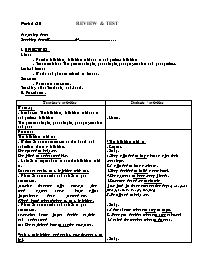Bài soạn môn học Tiếng Anh 11 - Period 50: Review & test

I. OBJECTIVES
Aims:
- Use the infinitive, infinitive without to and perfect infinitive
- Tense revision: The present simple, past simple, past progressive and past perfect.
Lexical items:
- Words and phrases related to lesson.
Structure:
- Use some structures.
Teaching aids: Textbook, sub-board.
II. Procedures.
Bạn đang xem tài liệu "Bài soạn môn học Tiếng Anh 11 - Period 50: Review & test", để tải tài liệu gốc về máy bạn click vào nút DOWNLOAD ở trên
Period:50 REVIEW & TEST Preparing date: Teaching date:B2.........................B4.................................. I. OBJECTIVES Aims: - Use the infinitive, infinitive without to and perfect infinitive - Tense revision: The present simple, past simple, past progressive and past perfect. Lexical items: - Words and phrases related to lesson. Structure: - Use some structures. Teaching aids: Textbook, sub-board. II. Procedures. Teacher’s activities Students’ activities Warm-up - Introduce: The infinitive, infinitive without to and perfect infinitive The present simple, past simple, past progressive and past - Listen. Grammar The infinitive with to: - Writes Ss some sentences on the board and underline the to + infinitive. She agreed to help me. She failed to understand him. - Asks Ss to repeat how to use the infinitive with to. Structure: verb + to + infinitive with out. - Gives Ss some verbs and ask Ss to put sentences. promise threaten offer attempt plan tend appear seem hope affort forget learn dare pretend etc. (What/ how/ where/ when )+ to + infinitive. - Gives Ss some verbs and ask Ss to put sentences. remember know forget decide explain ask understand ex: She explained how to use the computer. Verb + to infinitive and verb + complement + to inf. want ask expect help would like/ prefer ex: I would like to give her a helping hand. He asked me to marry him. Verb + complement + to infinitive. tell order remine warn force invite enable teach persuad get. Ex: He taught us how to write a dialogue. *The infinitive with to - Repeat. - Study. 1.They afforded to buy a house after their marriage. 2.I afforded to lose a minute. 3.They decided to build a new hotel. 4.She appears to have many friends. 5.Someone dared me to abstain from food for three consecutive days.( có người thách tụi nhịn ăn ba ngày liờn tiờ́p) 7.He offered to help me. - Study. 1.I don’t know where to stay or to go. 2. Have you decides where to stay at home? 3.I asked the teacher what to do next. - Study. 1.She wanted to sit alone in the room. 2.I would prefer to give him a present on birthday. 3.We expected mum to buy us a lot of gilfs. - Study. 1.I invited him to come to party in my house. 2.He forced me to go. Infinitive without to. - Asks Ss to repeat how to use the infinitive without to. Modal auxiliary verbs (can, could, may, might, will, would, shall, should,........ had better, would rather/ soonerand rather than). Ex: she can sing very beautifully. Verb + complement + bare infinitive. Make and Let Summer made me feel tired. Perfect infinitive Seem, appear, pretend........ Ex: Infinitive without to - Study. 1.She may be late. 2.We shall overcome. 3.you had better take your father’s advice. 4.they decided to join volunteer work rather than go on holiday. - Study. 1.Why don’t you let him go. 2.They made me do it. - Study. 1.He seems to have lost weight. 2.We presend to have known the truth. Tenses * The present simple: - Asks Ss to repeat how to use: The present simple tense is used to refer to repeated or habitual action , facts or truths , and custom. Example: 1.The earth goes round the sun. 2.I go to work by bus everyday. * The present simple: - Repeat: Suggesred answers: Form: I,you They + Verb ( without to ) He,She ,It +Verb + s/es Example : 1. I get up early every morning. 2.Tom comes from England. Simple past tense: - Remind the use of this tense. *The simple past tense is used to refer an action completed at a definite point of time in the past. Example: 1.We bought the house a year ago. - Asks Ss to make examples. *Simple past tense: Form: I,We,They + PII/v-ed He ,She It + PII/v-ed Eg: He went to Paris last Summer He died in 2000. She saw a film last night. He led them into a room. * The present perfect: - Asks Ss to remind how to use of this tense: *The present perfect tense is used to refer to a past action without definite time or recently complete action. Example: 1.I have seen that film. * The present perfect: - Remind: - Suggesred answers: Form: I,you They + Have + past participle (V3) He,She ,It + Has + past participle (V3) Example : 1.He has just seen her 2.She has visited Ha Noi several times this year. past perfect tense: - Repeat the use of this tense. - Asks Ss to make examples. * past perfect tense: Form: I,We,They + had +V3: past participle He ,She It + had ( past participle) .. Eg: We had lived in Hue before 1988 When I got up tis morning,my father had already left Present continuous: - Repeat the use of this tense. - Asks Ss to make examples. Present continuous: You, We,They + are + v-ing He ,She, It + is v-ing Eg: She is writting a letter. We are playing football. Past continuous: - Repeat the use of this tense. - Asks Ss to make examples Past continuous: You, We,They + were + v-ing He ,She, It + was + v-ing Ex: I was watching TV when the phone rang Homework - Asks Ss to review grammar again. - Work at home
Tài liệu đính kèm:
 REVIEW & TEST 50.doc
REVIEW & TEST 50.doc





